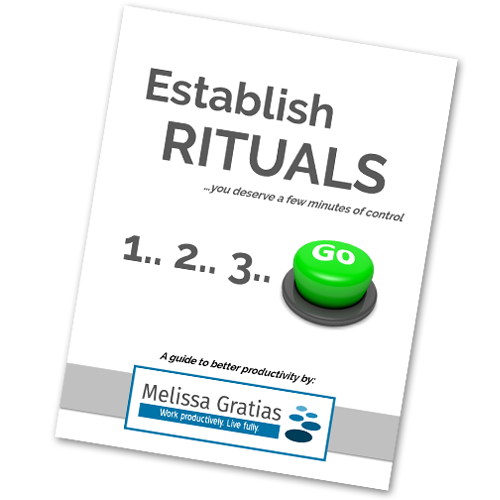
If you are outside the legal profession (and missed the John Grisham novel in the 90’s), then you may not be familiar with the term rainmaker. A rainmaker is someone who is superior at finding, nurturing, and closing business deals. They bring in clients. They generate revenue. Often, lots of it.
Robin Hensley, president of Raising the Bar, is a rainmaker. She’s so good at it that she has helped more than 1,000 attorneys and accountants make rain in their own practices. She has won almost every award you can give a business development coach and is notorious for her ability to turn her long-term clients into multi-millionaires.
So, I’m sure you can see why Robin Hensley has a special place among my squad of #ProductivitySuperheroes.
And, here’s the question we always ask of these superheroes:
How do you do it?
For Robin, a secret to success is honoring “Gold Time” in your life and work.

Gold Time is a term given to the time you spend working on tasks that are important but not urgent. You may recall that Stephen Covey referred to this as Quadrant 2 activities. Gold Time is usually spent doing things like planning, strategy deployment, personal development, and relationship building – tasks that will have the biggest impact.
Robin both practices and preaches the benefits of Gold Time. And, like everyone else in the real world, she has to be very intentional about it. Gold Time activities are the easiest to procrastinate. The tyranny of the urgent takes hold.
So how do we honor Gold Time and make it rain in our work? Here are some of Robin’s tips:
- Block time on your calendar for Gold Time. What tends to work best for Robin and her clients is 15 minutes at the start of every work day.
- Hook your Gold Time onto an already-established habit. For example, “Before I go run, I must do these three things.” If you are an end-of-day person, don’t leave work until your Gold Time is done.
- Keep Gold Time activities on your to-do list, but have a system to highlight or categorize them. Robin keeps a centralized to-do list, and writes her Gold Time tasks for the day on a piece of paper in front of her monitor.
- Make steady progress on your Gold Time activities. This is a marathon, not a sprint.
Does Gold Time work?
One of Robin’s attorney clients successfully applied these principles and her book of business grew from $500 thousand to $26 million a year. She hired 88 attorneys to support her. Last year this client met her goal of taking home over $1 million.
So, Gold Time makes rain.
My Take on Gold Time
First of all, I have to say that I do not (as of the writing of this article) block off Gold Time on my calendar every day.
I perform Gold Time activities daily, but I run the show from my task list, not my calendar.
But I can absolutely see the value-add of blocking off the time. Like everyone else, I can fall prey to the tyranny of the urgent.
Here are my recommendations if you’d like to make progress on incorporating Gold Time into your work:
- Set goals. If you don’t have big-picture goals that you want to achieve, then you likely won’t have any Gold Time activities to perform.
- Review your to-do list. Make special note (using colors, labels, or symbols) of the tasks that are Gold Time-related. If there are few or none, change that.
- Get an accountability partner. Share your goals and related Gold Time activities with someone. Robin is a client of mine. Coaches need coaches, too!
- Reduce your distractions. You do have the power to limit the interruptions; particularly the self-imposed ones (email alerts, anyone?).
- Track your progress. You are likely accomplishing more than you think. Keep a running list of the Gold Time activities you’ve successfully completed.
Whether you call it Gold Time, Quadrant 2, MITs (Most Important Tasks) or something else entirely, the critical thing is to prioritize your activities.
You are likely familiar with the Pareto Principle – the paradigm where 80% of your results come from 20% of your efforts.
Rainmakers can quickly identify their most valuable 20%. Now, that’s gold.
This article is a part of my #ProductivitySuperheroes series where I profile people who are exceptional at managing their time, tasks, information and/or life in general. If you’d like to nominate yourself or someone you admire, please email getproductive@melissagratias.com.

Are you ready to form productive habits that will change your work and life?
Read my eBook Establish Rituals…you deserve a few minutes of control.
 Melissa Gratias (pronounced “Gracious”) used to think that productivity was a result of working long hours. And, she worked a lot of hours. Then, she learned that productivity is a skill set, not a personality trait. Now, Melissa is a productivity expert who coaches and trains other businesspeople to be more focused, balanced, and effective. She is a prolific writer and speaker who travels the world helping people change how they work and improve how they live. Contact her at getproductive@melissagratias.com or 912-417-2505. Sign up to receive her productivity tips via email.
Melissa Gratias (pronounced “Gracious”) used to think that productivity was a result of working long hours. And, she worked a lot of hours. Then, she learned that productivity is a skill set, not a personality trait. Now, Melissa is a productivity expert who coaches and trains other businesspeople to be more focused, balanced, and effective. She is a prolific writer and speaker who travels the world helping people change how they work and improve how they live. Contact her at getproductive@melissagratias.com or 912-417-2505. Sign up to receive her productivity tips via email.


Melissa, your insights into productivity are always eye-opening, and this post is no exception. Thanks for helping me to get more out of my days.